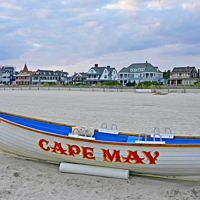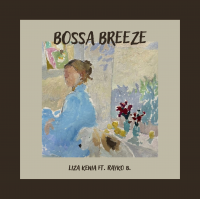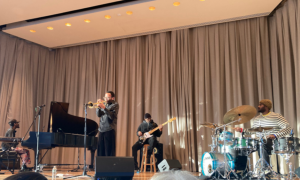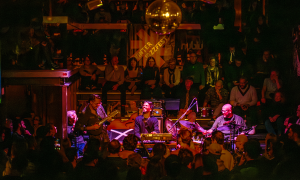Home » Jazz Articles » Live Review » Chicago Jazz Festival 2004
Chicago Jazz Festival 2004
Third stream music isn't getting much attention, but Orbert Davis, a Chicago trumpeter, arranger and educator, hopes to change that...
Three giants of jazz, names you can build an entire jazz festival around ... even if they've all long passed on to that Great Big Band in the Sky.
All three were born in 1904, prompting the Jazz Institute of Chicago to schedule centennial tributes to them at the annual, free Labor Day Weekend festival.
There were plenty of other memorable sets, too, making this one of the best bashes Chicago has put on in the dozen years since I started attending.
The Basie tribute brought together the Kansas City Seven ... four hornmen and a rhythm section, all of whom played with Basie himself. Tenor man Frank Wess, fluegelhorn player Clark Terry, trombonist Benny Powell and clarinetist Buddy DeFranco are all in their 70s or 80s, but still play with vigor and heart, spurred on by that propulsive rhythm section that captured the Basie sound even without those trademark Freddy Green guitar chords.
A poignant moment came when Frank Foster, a stalwart in the sax section for years who took over leadership of the band after Basie's death, came onstage in a wheelchair, unable to play anymore because a stroke stilled his left hand. He conducted, cracked some jokes, then got caught up in a driving "Lester Leaps In," snatching up his walker, swung it to and fro and blew up a storm into the curved handle.
Bennie Wallace put together a nonet for the Coleman Hawkins salute. Wallace has the brawny tone and swaggering attitude that distinguished Hawkins, and chose his bandmates well, especially the free spirit Ray Anderson on trombone, Anthony Wilson on guitar and Herlin Riley on drums. Also well chosen were selections from the Hawk's repertoire, from a powerfully swinging "Disorder at the Border" to the seductive "La Rosita" to the inevitable "Body and Soul," marked by a tribute-within-a-tribute to pianist James Williams. Recently deceased, the pianist was to have been in this band.
The Fats Waller tribute was tame by comparison, with the genteel pianist Butch Thompson leading a sextet playing a familiar assortment of tunes with not much of the Waller flair and none of the sly and saucy vocals.
Preceding the three days and nights of free events in Grant Park was a ticketed concert at the Symphony Center by a big band devoted to music by the old Thad Jones-Mel Lewis orchestra. Trumpeter Jon Faddis acted as conductor, emcee and featured soloist on tunes that illustrated how this band, now the Vanguard Jazz Orchestra, built on the Basie tradition and nurtured innovative composition and arrangement.
Singer Dee Dee Bridgewater got her start in this band and was out front for most of the show, delivering ballads, blues and scatting in ways that called the great Ella Fitzgerald to mind.
An indelible memory was made when Thad Jones' son, Bruce, lifted his toddler daughter onstage and Bridgewater cuddled her while crooning Jones' classic "A Child Is Born."
Conrad Herwig on trombone and Brian Lynch on trumpet, both Eddie Palmieri band alumni, came up with a winning idea ... The Latin Side of Miles - rearranging the "Kind of Blue" session and other Miles Davis classics in a Latin vein. Their compressed take on "Sketches of Spain" was superb, and when they moved on for a late-night set at the club Hothouse, we moved right along with them and were rewarded with "Flamenco Sketches."
Third stream music isn't getting much attention, but Orbert Davis, a Chicago trumpeter, arranger and educator, hopes to change that, leading a 55-piece Chicago Jazz Orchestra that premiered at the festival. The orchestral sound was initially drowned out by a jazz quintet seated stage front, but the sound was better balanced when singer Dee Alexander was called upon to re-enact Ella in front of Nelson Riddle doing the famous Gershwin songbook from the 1950s. She captured the purity of Ella's voice and her peerless sense of swing.
The ambitious program also included a jazzified aria from "Tosca" and a final triumphant Davis original, "Life Is Short," that would be right at home in the band book of any New Orleans brass band.
The intriguingly named Monksieland Band was a creation of trombone innovator Roswell Rudd and the late soprano sax master, Steve Lacy, who set out to recast the music of Thelonious Monk as if played by a Dixieland combo. Avant-garde trumpeter Dave Douglas and laid-back clarinetist Don Byron filled out the front line, with the horns engaging in gloriously dissonant polyphony. That's not the half of everything heard over this long weekend. Toshiko Akiyoshi led yet another Chicago big band in a sampling of her compositions. Memorable afternoon sets came from Joe Rendon's Latin sextet, altoist Jerry Dodgion and pianist John Campbell's serene hour together, Swing Gitan's Gypsy jazz and Ten Part Invention, an Australian band that boasts several fine writers.
One thing that struck me over the weekend was the preponderance of New York-based jazzmen on the bill, confirming that while Chicago is indeed a toddlin' town, it's not the jazz capital of the world. So how is it that Chicago can put on a great, free festival like this, and the Big Apple can't?
Tags
PREVIOUS / NEXT
Support All About Jazz
 All About Jazz has been a pillar of jazz since 1995, championing it as an art form and, more importantly, supporting the musicians who make it. Our enduring commitment has made "AAJ" one of the most culturally important websites of its kind, read by hundreds of thousands of fans, musicians and industry figures every month.
All About Jazz has been a pillar of jazz since 1995, championing it as an art form and, more importantly, supporting the musicians who make it. Our enduring commitment has made "AAJ" one of the most culturally important websites of its kind, read by hundreds of thousands of fans, musicians and industry figures every month.

























